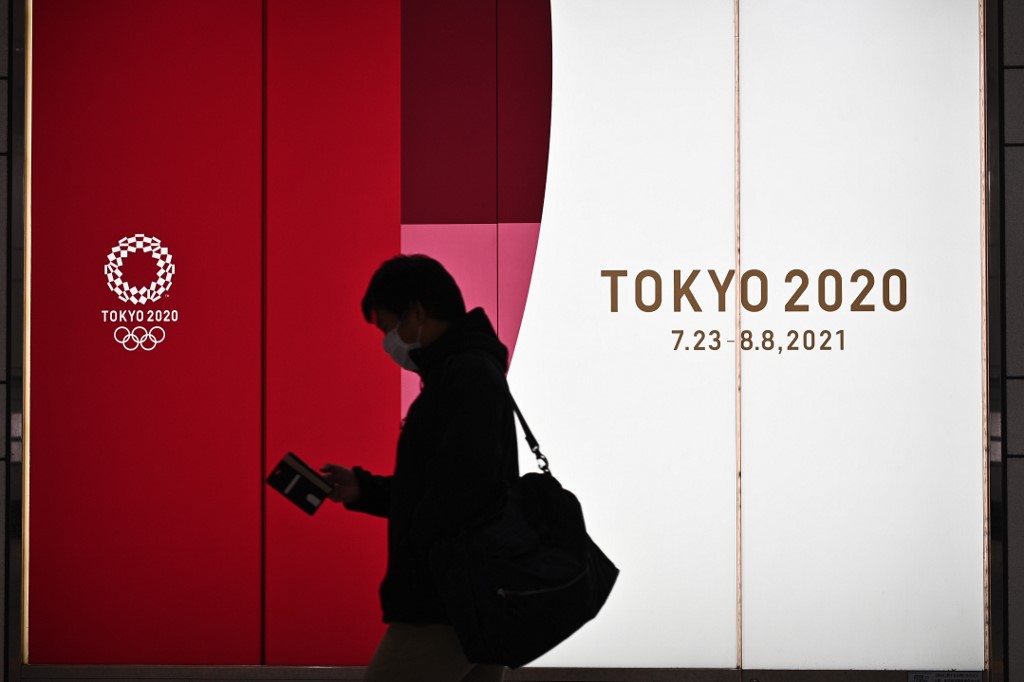
A man walks along a corridor past an official Tokyo 2020 Summer Olympics advertisement board in the Shinjuku district of Tokyo on November 30, 2020. (Photo by Philip FONG / AFP)
Tokyo’s governor said she can see “no circumstances” under which the virus-postponed 2020 Olympics will be canceled, despite rising coronavirus infections in Japan and continued public skepticism.
In an interview with AFP, Yuriko Koike warned that the fate of the Tokyo Games would impact future Olympics, including the 2022 Winter Games in Beijing and the 2024 Summer Games in Paris.
She acknowledged that a majority of the Japanese public now opposes hosting the Games next year, but said she was convinced those concerns could be overcome.
“The Japanese public and Tokyo residents are looking at the current conditions,” Koike said Tuesday.
“We are preparing for the future.”
The 2020 Games are the first to be postponed during peacetime, and organizers and officials have been at pains to insist that they can go ahead next year.
A further postponement has been ruled out by Olympic and Japanese officials, and Koike said “there are no circumstances” under which she could envisage the Games being canceled.
“Citizens of the world are seeing the Tokyo Games as a symbol that humanity will have defeated the coronavirus, that will lead to the Beijing Winter Games and then the Paris Games after that,” she said.
“Unless Tokyo takes full efforts against the coronavirus, then what will happen to Paris four years from now?” she said.
“I think we have to make Tokyo a success first, otherwise it will leave a serious impact on Paris.”
Domestic opinion appears at odds with the confident tones sounded by Japanese officials and organizers.
A poll released Tuesday by national broadcaster NHK found just 27 percent of respondents support holding the Games next year, with 32 percent backing cancellation and 31 percent favoring a further postponement.
‘People will come to see hope’
Koike said she believed those views would change, pointing to the extensive virus countermeasures that have been drafted by the government, Tokyo and Olympic organizers.
“I am convinced that people will come to see hope again, once coronavirus measures are firmly implemented,” she said.
Japan is currently battling a third wave of coronavirus infections, with Prime Minister Yoshihide Suga on Monday urging people to reconsider travel during the holiday period and halting a controversial domestic tourism campaign over the New Year.
Japan has seen a comparatively small outbreak of the virus, with fewer than 2,600 deaths reported since the country’s first case was identified in January.
But it faces particular scrutiny because of the ongoing preparations for the Games, now due to open on July 23, 2021.
A 54-page report released this month outlined the measures organizers say will keep athletes and spectators safe, ranging from tests before arrival to bans on cheering loudly in venues.
They have pointed to sporting events held this autumn in Japan, including a four-country international gymnastics competition with several thousand spectators, as evidence that the Games can be pulled off.
The arrival of new vaccines has bolstered their confidence, although inoculation will not be mandatory for athletes or spectators.
But the medical breakthrough does not appear to have moved the needle on public opinion in Japan, which may also have been hardened by news that the delay and virus countermeasures will add at least another $2.4 billion to the existing $13 billion price-tag for the Games.
The final cost has been hotly disputed, with an audit report last year estimating the national government spent nearly 10 times its original budget between 2013-2018.
Organizers countered that the estimate included items not directly related to the Games, but they have since cut various costs, albeit saving only an estimated $280 million.
“Leases have been extended by one year, so inevitably the cost is rising,” Koike said.
“But what I do not want is to make it a choice between whether we pay the cost or we drop the whole thing.”

